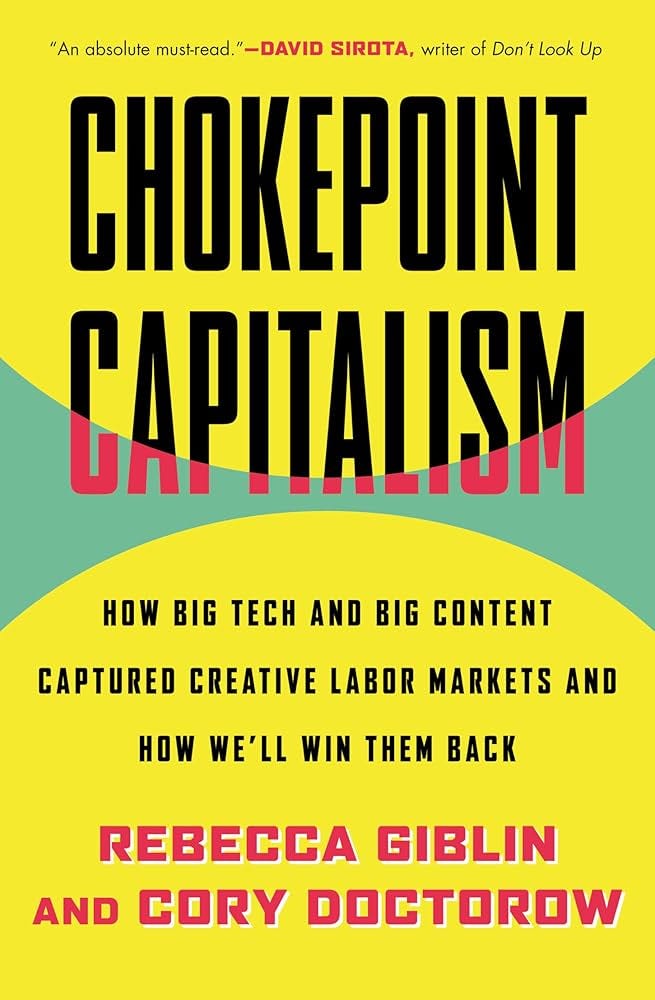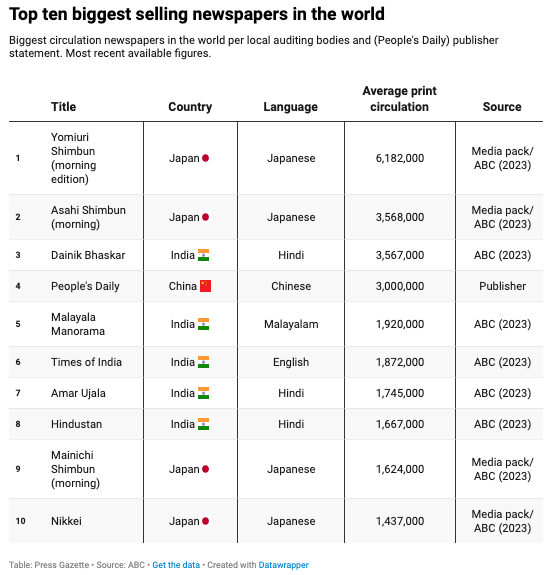The 277th Block: The media and the climate
This edition is by Margaux Blanchard (jk)
This week…
Your reading time is about 5 minutes. Let’s start.
Your Wikipedia this week: Perverse incentive
Here’s selection of top stories on my radar, a few personal recommendations, and the chart of the week.
ICYMI: The Previous Block was about press freedom and surveillance.
CORRECTION NOTICE: None notified.AI
Wired and Business Insider remove articles by AI-generated ‘freelancer’ Margaux Blanchard
Maya Yang for The Guardian:
Press Gazette says it was first alerted to the inauthenticity of Blanchard’s articles by Jacob Furedi, editor of a new magazine called Dispatch. Furedi said that he received a pitch from Blanchard earlier this month about “Gravemont, a decommissioned mining town in rural Colorado that has been repurposed into one of the world’s most secretive training grounds for death investigation”.
In the pitch, which Furedi shared with Press Gazette, Blanchard wrote: “I want to tell the story of the scientists, ex-cops, and former miners who now handle the dead daily – not as mourners, but as archivists of truth. I’ll explore the ethical tightrope of using real human remains in staged environments, the shadow economy of body donations, and the emotional toll on those who make a living from simulated tragedy.
“I’m the right person for this because I’ve reported on hidden training sites before, have clearance contacts in forensic circles, and know how to navigate sensitive, closed-off communities with empathy and discretion,” she added.
Furedi told the Press Gazette that pitch sounded like it was generated by ChatGPT and couldn’t find details about Gravemont. The Guardian has also not been able to verify details of the alleged town.
Upon asking Blanchard how she discovered the town, she replied: “I’m not surprised you couldn’t find much – Gravemont doesn’t advertise itself. I first heard about it while interviewing a retired forensic pathologist for an unrelated piece.”
She went on to say: “Over the next few months, I pieced together more through a mix of public records requests, conversations with former trainees, and hints buried in conference materials from forensic associations. None of them referred to it by name in print, but the details lined up. Eventually, I spoke with a former miner from the area who confirmed the site’s transformation after the mine closure.
“It’s one of those places that exists in the industry’s collective memory, but just under the radar enough to evade coverage – which is exactly why I think it would resonate with Dispatch readers,” Blanchard added.
Furedi told Press Gazette that despite the pitch seeming “very convincing”, he knew she was “bullshitting”. He asked Blanchard for public record requests, about her standard rate and how long she planned to spend in the field.
In response, Blanchard ignored Furedi’s request to see public records requests and instead said she would “ideally spend 5-7 days on the ground” and be paid around $670, Press Gazette reports.
Last Friday, Furedi accused Blanchard via email of publishing false stories to which she has not responded. Press Gazette further reports that Blanchard has not responded to its own request for her to provide evidence that she is a real person.
Charlotte Tobitt first reported the story on Press Gazette, which you can find here, which is behind a metered paywall. Loosely linked:
How to identify AI-generated videos online by Cecily Mauran for Mashable.
‘It saved my life.’ The people turning to AI for therapy by Hani Richter for Reuters.
Microsoft boss troubled by rise in reports of ‘AI psychosis’ by Zoe Kleinman for BBC.
Big Tech’s ‘AI for good’ spending increases in Africa. So does skepticism by Damilare Dosunmu for Rest of World.
MEDIA
Russia is quietly churning out fake content posing as US news
Dana Nickel for Politico:
A pro-Russian propaganda group is taking advantage of high-profile news events to spread disinformation, and it’s spoofing reputable organizations — including news outlets, nonprofits and government agencies — to do so.
According to misinformation tracker NewsGuard, the campaign — which has been tracked by Microsoft’s Threat Analysis Center as Storm-1679 since at least 2022 — takes advantage of high-profile events to pump out fabricated content from various publications, including ABC News, BBC and most recently POLITICO.
This year, the group has focused on flooding the internet with fake content surrounding the German SNAP elections and the upcoming Moldovan parliamentary vote. The campaign also sought to plant false narratives around the war in Ukraine ahead of President Donald Trump’s meeting with Russian President Vladimir Putin on Friday.
McKenzie Sadeghi, AI and foreign influence editor at NewsGuard, said in an interview that since early 2024, the group has been publishing “pro-Kremlin content en masse in the form of videos” mimicking these organizations.
“If even just one or a few of their fake videos go viral per year, that makes all of the other videos worth it,” she said.
While online Russian influence operations have existed for many years, security experts say artificial intelligence is making it harder for people to discern what’s real.
Storm-1679 developed a distinct technique in 2024 for combining videos with AI-generated audio impersonations of celebrity and expert voices, according to Microsoft’s Threat Analysis Center.
Loosely linked:
Why people embrace conspiracy theories: it’s about community, not gullibility by Robin Canniford (University of Bath) for The Conversation.
Czech film highlights Ukraine war conspiracy theories by Keno Verseck for DW.
How a fake story about Russia capturing British officers circulated in 13 countries by Quang Pham for France 24.
From bad boys to Proud Boys: Vice Media’s rise and fall by Dorothy Woodend for The Tyee.
Other curious links, including en español et français
LONG READ | Climate change tests the resilience of people and desert-adapted wildlife in Namibia by Petro Kotzé for Mongabay.
LONG READ | ‘A climate of unparalleled malevolence’: are we on our way to the sixth major mass extinction? by Peter Brannen for The Guardian.
INFOGRAPHIC | Stranded at sea: A decade after EU’s migrant crisis, hundreds still dying in Mediterranean by Joan Faus, Mariano Zafra and Sudev Kiyada for Reuters.
PHOTO ESSAY | Trying to keep cool in an increasingly hot world by Gaia Squarci with text by Taro Kaneko for The Guardian.
La nalga protesta por Adrián Chávez, ilustración de Mirelle Mora en Gatopardo.
Audios, allanamientos y un alto cargo despedido: un caso de corrupción acecha a Milei y su hermana por Mar Centenera en El País.
El “salvaje oeste” de Kick, la plataforma que ha emitido una muerte en directo por Carlos del Castillo en elDiario.es.
‘Fanfiction queer’: cuando las historias ficticias creadas por seguidores anónimos imaginan lo que la cultura no muestra por Andrea Proenza en elDiario.es.
Collaborations impossibles et hits bidons: l’ère des chansons deepfake a commencé par Franck Bodin dans RFI.
Faux Mirrsseau, vrai scandale familial par Ismaël Houdassine et Dominique Degré dans Radio-Canada.
La mort annoncée de la chanson de l’été par Daniel Blanchette Pelletier dans Radio-Canada.
What I read, listen, and watch
I’m reading Chokepoint Capitalism (2022) by Rebecca Giblin and Cory Doctorow on how Big Tech and Big Content captured creative labour markets.
I’m listening to Click Here’s ERASED, a four-part investigation into how China is wiping Uyghur culture from existence. (This is part four.)
I’m watching Al Jazeera’s documentary on how the Dutch manipulated the narrative of colonising Indonesia.
Chart of the week
Print is still king in Japan and India according to Press Gazette’s ranking of the biggest circulation newspapers in the world. Dominic Ponsford with more here.




